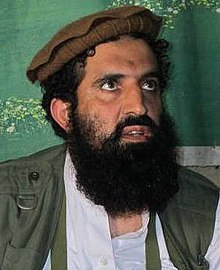Maulvi Faqir Mohammed is an Islamist militant and, until March 2012, a deputy leader of the Pakistani Taliban umbrella group Tehrik-i-Taliban Pakistan. He was reported as killed on 5 March 2010 during a helicopter gunship attack on militants by the Pakistani military although he denied the reports as false. In July 2011, he resurfaced on the air broadcasting radio shows out of Afghanistan. He was captured in Afghanistan on 17 February 2013, and released by the Afghan Taliban in 2021.

The insurgency in Khyber Pakhtunkhwa, also known as the War in North-West Pakistan or Pakistan's war on terror, is an ongoing armed conflict involving Pakistan and Islamist militant groups such as the Tehrik-i-Taliban Pakistan (TTP), Jundallah, Lashkar-e-Islam (LeI), TNSM, al-Qaeda, and their Central Asian allies such as the ISIL–Khorasan (ISIL), Islamic Movement of Uzbekistan, East Turkistan Movement, Emirate of Caucasus, and elements of organized crime. Formerly a war, it is now a low-level insurgency as of 2017.
Fazal Hayat, more commonly known by his pseudonym Mullah Fazlullah, was an Islamist jihadist militant who was the leader of the Tehreek-e-Nafaz-e-Shariat-e-Mohammadi, and was the leader of the Tehreek-e-Taliban Pakistan in Swat Valley. On 7 November 2013, he became the emir of the Tehrik-i-Taliban Pakistan, and presided over the descent of the group into factions who are often at war with each other. Fazlullah was designated by the Al-Qaida and Taliban Sanctions Committee of the Security Council in 2015, and was added to the U.S. State Department's Rewards for Justice wanted list on 7 March 2018. Fazlullah was killed in a U.S. drone strike in Kunar, Afghanistan on 14 June 2018.

The Pakistani Taliban, formally called the Tehreek-e-Taliban-e-Pakistan, is an umbrella organization of various Islamist armed militant groups operating along the Afghan–Pakistani border. Formed in 2007 by Baitullah Mehsud, its current leader is Noor Wali Mehsud, who has publicly pledged allegiance to the Afghan Taliban. The Pakistani Taliban share a common ideology with the Afghan Taliban and have assisted them in the 2001–2021 war, but the two groups have separate operation and command structures.

Hakimullah Mehsud, born Jamshed Mehsud and also known as Zulfiqar Mehsud, was a Pakistani militant who was the second emir of Tehrik-i-Taliban Pakistan, elected to the post on 22 August 2009. It was confirmed by TTP that he was killed in a U.S. drone strike in Pakistan on 1 November 2013.
Hafiz Gul Bahadur is the leader of a Pakistani Taliban faction based in North Waziristan. Upon the formation of the Tehrik-i-Taliban Pakistan (TTP) in December 2007, he was announced as the militant group's overall naib amir under Baitullah Mehsud, who was based in South Waziristan, but has largely distanced himself from the TTP due to rivalries with Mehsud and disagreements about the TTP's attacks against the Pakistani state.
Omar Khalid Khorasani was a Pakistani militant and one of the founding members of Tehreek-i-Taliban Pakistan (TTP). In 2014, he formed his own splinter militant group called Jamaat-ul-Ahrar (JuA) and was ousted by the Mullah Fazlullah-led Taliban. The same year, JuA swore allegiance to Islamic State (ISIS), however, a year later JuA rejoined TTP.
The 2014 Bannu Bombing was a bombing attack by the Taliban that killed twenty six Pakistani soldiers. Thirty-eight other people were injured as a result of the bombing.
On 8 June 2014, 10 militants armed with automatic weapons, a rocket launcher, suicide vests, and grenades attacked Jinnah International Airport in Karachi, Pakistan. 36 people were killed, including all 10 attackers, and 18 others were wounded. The militant organisation Tehrik-i-Taliban Pakistan (TTP) initially claimed responsibility for the attack. According to state media, the attackers were foreigners of Uzbek origin who belonged to the Islamic Movement of Uzbekistan (IMU), an Al Qaeda-linked militant organisation that works closely with TTP. The TTP later confirmed that the attack was a joint operation they executed with the IMU, who independently admitted to having supplied personnel for the attack.

Operation Zarb-e-Azb was a joint military offensive conducted by the Pakistan Armed Forces against various militant groups, including the Tehrik-i-Taliban Pakistan (TTP), the Islamic Movement of Uzbekistan, the East Turkestan Islamic Movement, Lashkar-e-Jhangvi, al-Qaeda, Jundallah and Lashkar-e-Islam. The operation was launched on 15 June 2014 in North Waziristan along the Pakistan-Afghanistan border as a renewed effort against militancy in the wake of the 8 June attack on Jinnah International Airport in Karachi, for which the TTP and the IMU claimed responsibility. As of 14 July 2014, the operation internally displaced about 929,859 people belonging to 80,302 families from North Waziristan.

Jamaat-ul-Ahrar was a terrorist organization that split away from Tehrik-i-Taliban Pakistan in August 2014. The group came to prominence after it claimed responsibility for the 2014 Wagah border suicide attack. In August 2020, it merged back to TTP.

Khyber was the code-name for a 2014–2017 military offensive conducted by Pakistan's military in the Khyber Agency in four phases; Khyber-1, Khyber-2, Khyber-3 and Khyber-4.

On 16 December 2014, six gunmen affiliated with the Tehrik-i-Taliban Pakistan (TTP) conducted a terrorist attack on the Army Public School in the northwestern Pakistani city of Peshawar. The terrorists, all of whom were foreign nationals, comprising one Chechen, three Arabs and two Afghans, entered the school and opened fire on school staff and children, killing 149 people including 132 schoolchildren ranging between eight and eighteen years of age, making it the world's fifth deadliest school massacre. Pakistan launched a rescue operation undertaken by the Pakistan Army's Special Services Group (SSG) special forces, who killed all six terrorists and rescued 960 people. In the long term, Pakistan established the National Action Plan to crack down on terrorism.
The following lists events that happened during 2015 in Afghanistan.

Hafiz Saeed Khan, also known as Mullah Saeed Orakzai, Shaykh Hafidh Sa'id Khan, or Maulvi Saeed Khan, was an Islamic militant and emir for the militant group Islamic State – Khorasan Province (ISIS–K) from January 2015 until his death in July 2016. Prior to 2015, Khan fought alongside the Afghan Taliban against NATO forces in Afghanistan, joined the militant group Tehrik-e Taliban Pakistan (TTP) as a senior commander, and later swore allegiance to ISIS caliph Abu Bakr al-Baghdadi, established ISIS–K in Afghanistan as the province's first emir until his death in a reported American drone strike.

The Islamic State–Taliban conflict is an ongoing insurgency by the Islamic State Khorasan Province (IS-KP) against the Taliban regime in Afghanistan. The conflict initially began when both operated as rival insurgent groups in Nangarhar; since the rise of the Taliban's state in 2021, IS-KP have targeted and assassinated Taliban members using hit-and-run tactics. The group have also caused incidents and attacks across the border in Pakistan.

Mufti Noor Wali Mehsud, also known as Abu Mansoor Asim, is a Pakistani Islamic scholar, cleric and jurist who is the 4th emir of the Pakistani Taliban. On 22 June 2018, Mehsud was appointed as the emir of TTP after the assassination of former emir Mullah Fazlullah in a US drone strike in Kunar, Afghanistan.
On 16 April 2022, the Pakistani military conducted predawn airstrikes on multiple targets in Afghanistan's Khost and Kunar provinces. Afghan officials said the attacks killed at least 47 civilians and injured 23 others. Initial reports described the attacks as either rocket strikes or aerial strikes carried out by a number of aircraft of the Pakistan Air Force, and Afghan officials claimed the operation was carried out by Pakistani military helicopters and jets. Pakistani officials initially denied Pakistan carried out the airstrikes, but Pakistani security officials later claimed the airstrikes involved drone strikes from inside Pakistani airspace, and that no aircraft were deployed. Some reports said the Pakistani airstrikes also targeted parts of Paktika Province.










